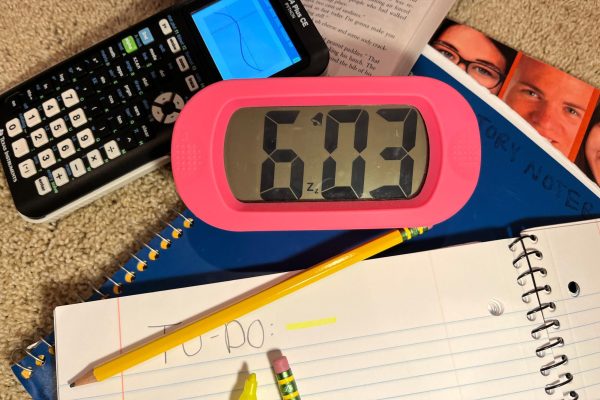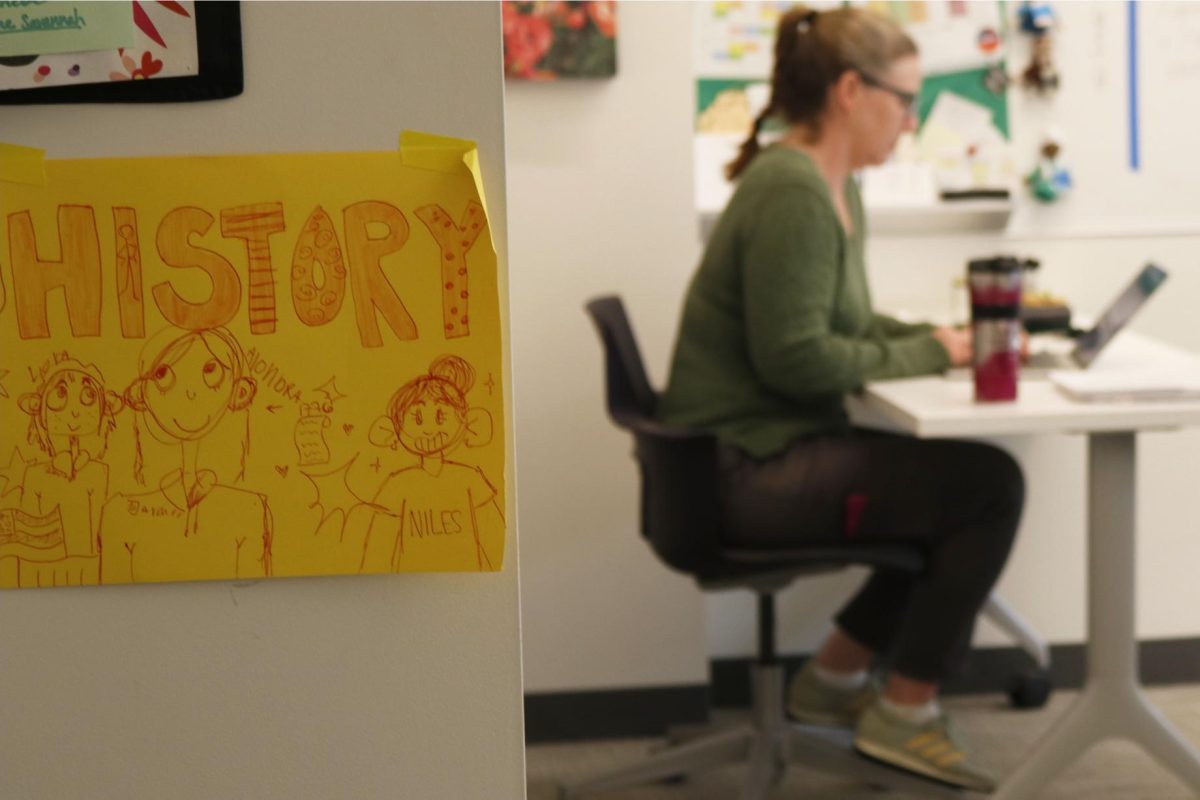Have you ever fought to stay awake during your second period class or while studying late on a school night? Have you ever felt so exhausted during the day that you could barely maintain a conversation with your peers? If so, you are not alone.
A study from the Sleep Foundation found a full night’s rest is crucial for cognitive functioning, whether it is studying or critical thinking. As such, it is important for students to get an adequate amount of sleep so they can learn to the best of their ability.
Adolescents should be sleeping for 8-10 hours per 24 hours in order to have peak health and energy during the day, according to the American Academy of Sleep Medicine. However, the Centers for Disease Control and Prevention states, “fewer than one in four U.S. high school students gets the recommended eight hours of sleep per night.”
When puberty begins, an adolescent’s circadian rhythm and their body’s release of melatonin shifts to a later time, resulting in teenagers sleeping later. This shift is one of the many factors influencing the lack of sleep adolescents get. It is not harmful to an individual’s health to have a night or two of bad sleep throughout the week, but regularly sleeping poorly leads to sleep deprivation, a condition that results from consistent sleep deficiency.
Sleep Deprivation
Sleep deprivation has become an increasing problem in America over the past few years due to more device usage and fewer people prioritizing sleep. Side effects of sleep deprivation include memory problems, a weaker immune system, drowsiness and mood swings.
Sleep deprivation often stems from poor sleep hygiene — inconsistent sleep schedules and lack of healthy sleep habits — medical conditions or stress. Out of those causes, stress is a the factor that heavily impacts middle and high school students, as a 2023 study found “61% of teenagers between the ages of 13 and 17 feel stress over producing satisfactory grades.”
Senior Anna Entin said she usually falls asleep around 11 p.m. or 12:30 a.m. and wakes up at 6:45 a.m. on weekdays. Entin said she makes up for staying up late by catching up on sleep during the weekends.
“It is my decision to go to bed late, and I regret it every single morning when I wake up. I sleep procrastinate because I feel like I have so much going on during the day, so having that free time at the end of the day is really nice,” Entin said. “I think when I’m tired, smaller things become more stressful … but in general, I’m pretty good at existing [while tired]. I could be very tired and still do well … I am a high functioning sleep-deprived person.”
Many students in America often choose to stay up late or can’t help but to stay up late due to busy schedules. According to an article by Cleveland Clinic Health Essentials, sleep debt is the difference between the sleep recommended for your age group and the real amount you get each night. In order to eliminate sleep debt, catching up on lost sleep is necessary; the article stated that a 2020 study “found that catch-up sleep was associated with better health outcomes than just staying sleep deprived.”
Dr. Amy Jean specializes in pediatric endocrinology and is an employee at the University of Pittsburgh Medical Center. She said there are several negative physical and mental effects of sleep deprivation.
“When you’re sleeping, your body repairs itself. Let’s say you get sick easily — your body’s trying to heal itself when you’re sleeping, and so if you keep cutting on your sleep, it puts you at a minimize immune response for fighting infection,” Jean said. “If [you] have issues with anxiety and mood instability, it certainly adds more to it.”
Impacts on Academic Performance and Social Interaction
Senior Anaiya Asomugha said she usually falls asleep around 11 p.m. and wakes up between 6:45 a.m. and 7:00 a.m. on weekdays. Although she gets the recommended eight hours of sleep, Asomugha still feels like she cannot get enough sleep.
“I’m doing so much that I need sleep,” Asomugha said. “But because I’m doing so much it’s hard to get sleep because I feel like, ‘I have to keep doing this, but I forgot about that assignment, and what about this college essay?’ I feel like I’m not doing enough, and so I have to stay up and finish it, which causes me to get less sleep.”
Tenth grade Dean of Culture, Community and Belonging Tracy Poverstein said she notices students are more tired at the beginning of the week. Poverstein adds that a lack of sleep can impact social and emotional learning.
“When you’re not getting enough sleep, it affects your emotions, and it affects how you’re feeling. It’s going to affect how you are able to engage in class, and it affects how we all show up to school,” Poverstein said. “Whether or not, in your social interactions with your friends, you might feel cranky, and that things … get to you a lot quicker.”

Jean said lack of sleep is harmful to students’ learning because it impacts both long-term and short-term memory retention.
“When you go to school, you’re learning tons and tons of different facts. When you go to sleep at night, that’s where you take your short-term memory and you deposit it into [your] long term memory,” Jean said. “If you’re chronically sleep deprived, that is probably why you have difficulty retrieving information. You could probably do well at tests [or] pop quizzes, but when it comes to a final exam, you will not remember stuff.”
The Oracle sent out a survey to the Archer student body about student sleep schedules. Out of 485 students, 183 responded. One question asked if students feel their academic and social lives are impacted by a lack of sleep. A student responded that not getting enough sleep negatively impacts their ability to learn and put effort into their daily life.
“I end up being tired and this results not processing information well, which can further lead to lower academic performance and more moody social behavior,” a student wrote. “Also, I might be tired and just not at a place where I am able to put my best foot forward.”
Eighth grader Asha Parry usually wakes up at 6:30 a.m. and goes to bed at around 10:30 p.m. on weekdays. Similarly to the student’s response, Parry said she sees a noticeable difference in her behavior if she does not sleep well.
“If I don’t get enough sleep one night, I’m definitely more tired,” Parry said. “I don’t ask as many questions [in class], and I don’t talk to my friends as much.”
How to Improve One’s Sleep Schedule
When it comes to improving an individual’s sleep schedule, Jean said limiting digital device usage before bed is ideal for the production of melatonin. She said the blue light produced from screens delays the release of melatonin because it makes the body feel more awake as if it is daytime.
Poverstein added that those with good sleep hygiene often incorporate healthy habits into their routine before sleeping.
“They really keep to a schedule,” Poverstein said. “They have a bedtime routine where they decide how they are able to relax, whether it’s a cup of tea, a hot bath or reading before [bed].”
Sophomore Sasha Capitori-Poole usually goes to bed between 9:30 p.m. and 10:30 p.m. during the school week. She said she maintains her sleep schedule by planning ahead for the next day.
“I know that if I get under a certain amount of hours of sleep, I’m going to be too tired to do anything the next day,” Poole said. “I try to plan around that, and I try to go to bed before a certain time so I can still be awake and okay the next morning.”
The National Library of Medicine found workaholism has increased since the COVID-19 pandemic, and it often leads to insufficient sleep. According to Experience Life, one strategy people can practice to overcome the workaholic culture is “[spending] at least 20 minutes every day (10 minutes at a time is fine to begin with) consciously doing nothing. Don’t think about what’s next on your to-do list or feel like you need to fill the time.”
Poverstein added that students may overbook their schedules or stay up later than necessary working if they are not taking as many accelerated courses or extracurriculars compared to their peers. She said that this is an example of the “workaholic” mindset in American culture that impacts sleep.
“Part of our American culture is that being a workaholic is perfect — almost like a prize, where we don’t prioritize relaxation time or sleep time,” Poverstein said. “[Students] are so scheduled that if you don’t have anything you’re supposed to be doing or you don’t have plans on the weekend, it almost feels like you’re missing out on something. It is part of our culture that we don’t know we admire workaholics.”








